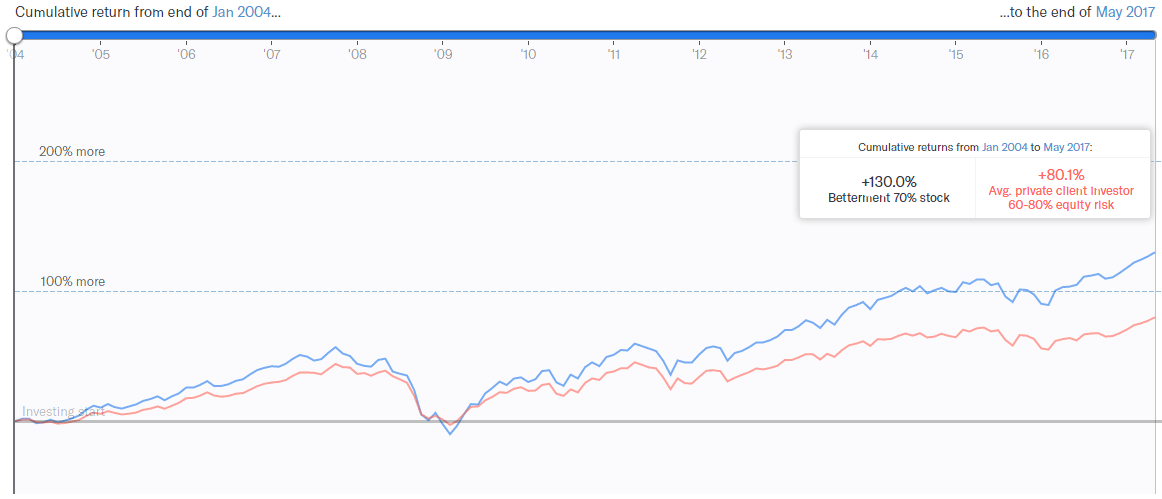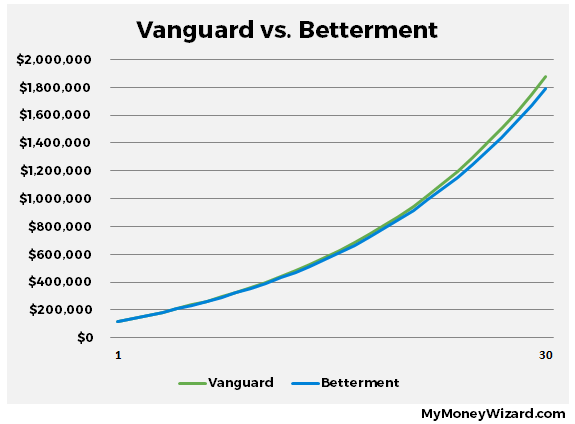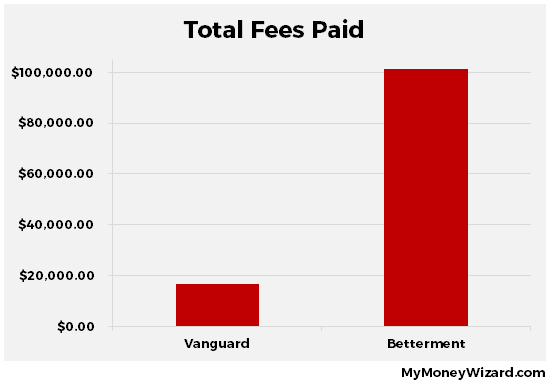

Last Updated: April 2018
Drumroll please… Today’s post is easily the most requested topic since I started this blog a year and a half ago.
If you’re one of the hundreds of readers within the past few months who I told to be lookout for this article, then I have two comments:
- Thanks for being a reader for so long.
- Sorry for taking so long!
In any case, I think you’ll find this mammoth post worth the wait!
To the current state of affairs…
Despite efforts made by the fancy suit wearing financial “experts,” the cat is out of the bag. Passive investing is more profitable than active management. There’s simply too much proof to ever claim otherwise.
With this epiphany out of the way, since 1975, the only investment advice given with any level of honesty involves investing in Vanguard index funds.
For years, this advice stayed steady. Then, a few Silicon Valley tech startups began using the power of computers to enhance the power of passive investing.
Enter The Robo-Advisor. These high tech investing platforms come in a few brand names, with Betterment quickly becoming the industry leader.
This all leads to an obvious looming question on the good index investor’s mind:
Should you invest through Vanguard or Betterment?
What is Betterment?

As the commercials will tell you, Betterment is an investing service intended to be 100% hands off. You choose a portfolio allocation and risk tolerance, and then those investing robots automatically:
- Choose low cost ETFs to invest in
- Automatically rebalance your shares, to hold steady your desired portfolio allocation.
- Perform tax loss harvesting to minimize the taxes owed on your investments.
We’ll get into all those details, but it’s a pretty nifty concept. Low cost ETFs save money on fees, rebalancing ensures you’re taking advantage of subtle market movements, and tax loss harvesting saves you money on taxes owed.
It’s a wet dream for investors who want to sock money away and never think of investment management again. The process is intended to be entirely hands off, and it is. You find ways to save money, the robots do the rest.
A lot of personal finance blogs will end the discussion here – partly thanks to Betterment’s position as a solid investment option, and partly thanks to the company’s pretty lucrative affiliate program for bloggers.
My site, on the other hand, has never been all that optimized for income, and I find it more fun to dig a little deeper. So let’s take a closer look.
How much does Betterment cost?
Pretty much the most important question whenever anyone pitches you anything to do with your money.
In exchange for Betterment’s totally hands-off automation, you’ll be charged a 0.25% fee. Plus the expense ratios of whatever index funds Betterment robots chooses for you. The good news is that the software sticks to low fee index funds, which is exactly what we want.
What sort of investments do the Betterment robots choose?
Vanguard funds, mostly.
At this point, you might be a step ahead of me… Yes, this article’s title is grossly misguided.
Despite the way this question is usually framed, Vanguard vs. Betterment isn’t an apples to apples comparison. Apples to oranges maybe… or even apples to the apple tree.
The much more accurate comparison is Betterment vs. a Financial Advisor.
And on that front, Betterment serves as just about the most honest and reasonably priced financial advisor around. Why?
- Betterment’s 0.25% fee is noticeably cheaper than most financial advisors, who typically charge 1% or more.
- Betterment wisely sticks to index funds. You know how much me, Warren Buffet, and just anyone else with a surface knowledge of the stock market believes in index investing.
- Even better, Betterment sticks mostly to the cheapest index funds around, Vanguard.
- If hands off investing is your goal, you’re in luck. You won’t even need to visit your new robot advisor’s office, since, well… your robot advisor’s office lies somewhere in the hard drive of betterment’s server room.
And the data checks out. As far as portfolio returns, Betterment basically mops the floor with traditional financial advisors.

But of course, comparison to an overpriced financial advisor doesn’t really give us a great picture. We’re more interest in just how much Betterment’s automation is costing compared to say, a self-managed Vanguard portfolio.
Betterment vs. Vanguard – How much does Betterment REALLY cost?
Compound interest is a helluva drug. Which usually is great for you, the investor.
Unfortunately, it’s also good news for anyone who wants to charge you a seemingly small fee over a long time period. Like say, a 0.25% fee.
For the below example, I’ve made a few assumptions:
- You have $100,000 to invest
- You plan on investing $1,000 a month for 30 years.
- Your investments return historical market averages of 7%
- You keep your investments at Betterment, who charges you a 0.25% fee.


The above chart just shows the effect of Betterment’s 0.25% fee, which costs over $101,317 during a typical investing career. You’ll also have to pay the underlying expense ratios of whatever Vanguard funds Betterment chooses for you, which brings the total cost to at least $118,000.
Compare this to a Vanguard index fund like VTSAX, which sports a rock bottom expense ratio of just 0.04%, or about $16,000 over 30 years.
No matter which way you slice it, you’re paying over $100,000 for Betterment’s automation. Advantage: Vanguard.
As far as financial advisors go, that’s really not too bad. By comparison, the 1% charged by an average advisor or poorly chosen retirement account can cost nearly $700,000.
BUT, and this is Sir Mix A Lot sized butt, that $101,000 doesn’t tell the full story. Betterment comes with two neat features that help to offset their cost: automatic portfolio rebalancing and tax loss harvesting.
Betterment vs. Vanguard: Automatic Portfolio Rebalancing
Portfolio rebalancing is the idea of keeping your asset mix constant throughout market changes. This is done by selling assets that have increased in value while buying more of the relatively cheap ones.
For example, imagine you want a portfolio of 50% stocks and 50% bonds. You first created this portfolio during the trenches of 2009. Over the next 8 years, stocks pull off a historic recovery and start rallying hard, while bonds stay stable.
Because of the huge increase in stock prices, your once 50/50 portfolio might now look closer to 70% stocks and 30% bonds. Because stocks are riskier than bonds, this shift represents a riskier portfolio than your original goal.
To correct the issue, you sell some of your high-priced stocks and buy some relatively cheap bonds. This is portfolio rebalancing, and the systematic process of buying high, selling low serves to increase your risk adjusted returns.
Do you need Betterment’s robots to take advantage of rebalancing?
In a word, no. Standard advice involves reviewing your portfolio once a year or so, to make sure everything is in line. And actually rebalancing is a quick and simple process; I’ve timed myself completing the whole chore in less than 15 minutes.
But Betterment’s robots think they can do one better. Since those robots don’t have to sleep and aren’t at all concerned about a social life, they can monitor your allocation 24/7, and immediately correct any portfolio irregularities.
That’s hard for us mere mortals to compete with, and the result is a portfolio which constantly represents your exact desired risk profile. Advantage: Betterment.
Betterment vs. Vanguard: Tax Loss Harvesting
Tax loss harvesting is a tax reduction strategy where you sell an investment after a decline in value. This realizes or “harvests” the loss, which can then be used to offset future investment gains or even ordinary income.
Do you need Betterment’s robots to take advantage of rebalancing?
No again. This can be done manually, and again takes just a few minutes a year.
Tax loss harvesting is especially easy when stock prices are falling. During market rallies, tax loss harvesting requires slightly more monitoring, which is where the robo-advisor has a noticeable advantage.
In certain scenarios, Betterment can harvest up to $3,000 of losses per year. As a quick example of how powerful this is… If you’re in the 25% tax bracket, that’s real savings of $750 a year. Put another way, if Betterment is able to silently harvest $3,000 in tax losses per year, that’s enough to pay for a year of Betterment’s fees on a portfolio as large as $1.2 million! Pretty cool.
Betterment estimates effective tax loss harvesting can increase portfolio returns up to 0.77% per year! Again, that’s enough to make the 0.25% fee seem pretty reasonable! Advantage: Betterment.
Two Negatives of Betterment’s Tax Loss Harvesting
The big catch there is whether or not Betterment is actually able to harvest $3,000 of loss per year. Tax loss harvesting is easy to do when you first open your Betterment account, but it will get more difficult over time.
Why? For one, you need losses if you’re ever going to harvest those losses. As the relentless upward march of the market continues, at some point your portfolio value will have increased so much that only your new contributions are realistically eligible for tax loss harvesting.
In other words, tax loss harvesting tends to get loss profitable over time, and at some point, it becomes very unlikely that loss harvesting will be able to pay your fees.
There’s another complicated factor to consider: Tax Loss Harvesting might create something the IRS calls a wash sale.
1. Wash Sales: The thorn in a part time Betterment investor’s side

As part of my due diligence in writing up this post, I initially planned on creating a small Betterment account for myself, so I could report back on the experience first hand.
Unfortunately, I quickly learned this isn’t really practical.
You see, when you perform tax loss harvesting, you can’t just sell a losing stock and then immediately buy it back. If you do so within a 30 day window, this is called a “wash sale.” Unless you want to hear a mean knock on your front door from the tax man, it’s best to avoid breaking this law.
On the other hand, you are allowed to buy a similar investment with a hopefully similar performance. With so many interchangeable index funds, Betterment’s algorithm can find similar index funds that won’t trigger a wash sale and perform pretty much the same.
BUT, things start to get really tricky when your entire portfolio isn’t with Betterment.
For example, imagine Betterment tax loss harvests an S&P 500 index fund on Monday. On Tuesday, your 401k (which isn’t managed by Betterment) automatically contributes a portion of your paycheck to an S&P 500 index fund. If the IRS deems those two index funds as “substantially identical,” you’ve just accidentally triggered a wash sale. The tax loss is disallowed, in some cases permanently, and you’re in trouble.
To avoid this headache, you either need to:
- Allow Betterment to manage 100% of your assets.
- Turn off Tax Loss Harvesting
- Make certain that your non-Betterment investments don’t hold any of the same index funds, or even any index funds that track a similar benchmark.
#1 and #2 cost you money. #1 means increased fees, and #2 means a decreased monetary benefits of using Betterment’s services. #3 is doable, but certainly outside the confidence level of someone who wants all their investments managed by someone else.
2. Tax Loss Harvesting is not really ideal for early retirees
This post on an early retirement blog wouldn’t be complete without a quick analysis of Betterment for early retirees.
We previously calculated that Tax Loss Harvesting gives us a “real savings” of $750 if it’s used to offset ordinary income at the 25% tax bracket.
If tax loss harvesting is instead used to offset long term capital gains, which typically carry a 15% tax rate, that value is reduced to $450. ($3,000*.15=$450) If less than $3,000 of losses are harvested, the value decreases further.
In other words, if you’re like most early retirees and find yourself in a lower tax bracket, the value of tax loss harvesting quickly approaches $0.
GoCurryCracker brilliantly outlines how he pays no taxes in early retirement. He does this by doing the opposite of Betterment’s flagship service; he actually harvests capital gains. This increases his cost basis which somewhat paradoxically reduces his taxes.
For this reason, Tax Loss Harvesting isn’t all that appealing for someone who plans to live a modest lifestyle in early retirement.
Betterment’s Risk of Uncertainty
This whole article also comes with a big asterisk. I’ve assumed fees of 0.25% throughout all my calculations and assumptions.
When Betterment debuted, the company actually charged fees of just 0.15%*. In January 2017, the company dropped a shocking news release announcing that expenses would be increasing to 0.25%.
*technically, Betterment’s original fees were 0.35% for accounts under $10K, 0.25% for accounts $10-99.9K, and 0.15% for accounts over $100K.
To say people were pissed is an understatement. And rightfully so. Investing your life’s savings with a company requires a huge amount of trust.
It’s important to remember that Betterment is a tech startup and funded by venture capitalist money. There’s nothing inherently wrong with that, but these companies must post a continuous profit.
The Economist reported on the slowing growth and profitability of Robo-Advisors shortly before Betterment hiked prices. What happens if growth starts to slow again?
Compare this to Vanguard, who’s owned by the investors and done nothing but reduce fees over the past 30 years. For my money (literally and figuratively) this is a huge edge to Vanguard. Advantage: Vanguard.
Betterment vs. Vanguard Review Recap
Coming down the home stretch, we’re sitting at a 2-2 tie between Vanguard and Betterment. Vanguard has the advantages on the fees, while Betterment has the advantage on automation.
Let’s wrap up one of the longest posts on this site into something a little more digestible:
Pros of Betterment:
- 100% automation of your investments. Send your money to Betterment and move on with your life. The robots handle all the details.
- Will save you hundreds of thousands of dollars compared to a traditional financial planner.
- Automatic portfolio rebalancing keeps your portfolio on track at all times.
- For those in higher tax brackets, Tax Loss Harvesting could pay for the fees.
- The platform comes with a super cool cell phone app that makes watching your investments pretty handy.
Cons of Betterment:
- The 0.25% fee is low, at least as far as financial advisors go, but it still costs about $100,000 more than Vanguard’s 0.04%.
- Realistically, if you want to take advantage of tax loss harvesting you need to turn over management of all your assets to Betterment, which means additional fees.
- Tax Loss Harvesting might not be ideal for everyone.
- Uncertainty about the company’s rising fees.
So, Should You Invest In Betterment?
My gut? If you’re reading a blog about money for fun, you probably have enough interest in the subject to cut out the middle man.
The biggest benefit to investing through Betterment is the exposure to low cost index funds. It’s nice they choose mostly Vanguard funds, but this is sort of like somebody telling you how much money you could save by shopping at Walmart, then charging you a big fee to go shopping at Walmart.
If you’re willing to pay $100,000 to avoid hassling with the basics of index funds, Betterment is a convenient luxury.
But even the advanced features of Betterment are not rocket science, and could mostly be replicated by a dedicated investor willing to spend no more than 2 hours a year on their money.
You already know from my net worth updates that I’m sticking with Vanguard, and I don’t see enough benefits from robo-advisors to make me switch any time soon. That said, it’s easy for a financial blogger to downplay the concerns of a beginner.
Betterment is a great tool. There’s nothing wrong with a little bit of training wheels, and those fees are worth it if the customer would have otherwise never hopped on the bike.
For someone who has been sitting on the fence for months, or even years, afraid of “making a mistake” with their money or not sure where to start, Betterment might be the push they need to get started. There’s no point stressing about a 0.25% fee while you’re missing out on 7% per year.
And if logging into a Vanguard account a couple times a year to double check portfolio allocation sounds like a hellish chore, outsourcing the task to Betterment might be a wise move.
The most common errors new investors make are waiting too long to get started, and making dumb decisions trying to beat the index. Betterment offers an awesome solution to both those problems.
If Betterment sounds good to you and you found this overview helpful, here’s an affiliate link for Betterment that will send some dollars towards this site’s ever increasing maintenance costs.
And no matter which option you choose, I continue to highly recommend a free Personal Capital account. Their high tech (and free!) investment analysis software is awesome for seeing all your money in one place. Plus, it will automatically track your spending, and even analyze your portfolio allocation, investment fees, and retirement plans.


Nice comparison essay. I have to say, though, that people following your blog would be more interested in taking a hands-on approach to managing their finances and investments, in order to understand their investments, and, most importantly, to cut the costs associated with investing. I know that fees can do the most damage to a passive-managed investment approach, so why increase the fees by using a “middleman” like Betterment, in return for a negligible decrease in time spent overseeing your investments? Furthermore, automatic rebalancing can result in realizing capital gains (selling winners to buy losers) and tax consequences that may not be offset by automatic tax loss harvesting. in my own portfolio, I simply direct new investment dollars each month to the lagging allocations, reestablishing my target allocation and never having to sell winners, thereby never having to pay capital gains tax on the sales.
I’ve really enjoyed your blog, great writing and interesting topics.
Good point about capital gains and rebalancing. And I agree, most people interested enough in money to read a blog about money, probably have the ambition to manage their portfolios by themselves.
That said, I have quite a few readers who are suffering from paralysis by analysis. For the people who otherwise would continue reading about money without taking any action, Betterment can be a great option to get them started.
Been using Betterment for over a year , TLH+ , automation etc. Everything is nice but one big point that everyone is missing here… Beating the market. Honestly, my betterment portfolio performance is nothing close to any major index. In fact , it looses money a lot even on default setting with auto rebalancing !
This concerned me a lot that , nowadays people are blindly focusing on pennies than buck. Back to fundamental folks , pay for something which beats the market than auto pilot investing with sub par returns.
Enough to say, I am moving back to vanguard’s. Where just a nice blend of great performing ETF will beat the market at minimum cost and I don’t mind to keep an eye out once in a quarter
Good review, Money Wizard. I appreciate that you don’t overtly favor one over the other (despite any personal opinion).
“Betterment is a great tool. There’s nothing wrong with a little bit of training wheels, and those fees are worth it if the customer would have otherwise never hopped on the bike.”
These two sentences nail it and I couldn’t agree more.
Betterment is a great tool for someone who is looking to get their investing feet wet and offers some good benefits for higher earners with the TLH. If you have a fundamental understanding of investing and are looking for a (tiny) bit more of a hands on experience, Vanguard will save you $$ over the long run while matching pure market based returns if invested similarly across both platforms.
Thanks for doing this write up! I know I asked a question about this on a post from a while ago. Was excited to read and it didn’t disappoint.
Awesome to hear you enjoyed it! Hopefully it was worth the half a year wait, haha.
Incredible review! This should certainly rank #1 when someone searching for a comparison article.
We have used Betterment for a while. The main function we use it for is a “Money Maker” account. Any excess money we don’t want in our savings (everything other than an emergency fund) we dump into our safety net account on Betterment. It’s nice having the luxury of investing “leftover” money into the market but yet still having it liquid.
Obviously, the money we are talking about is after our retirement accounts have been contributed too.
Does that make sense?
Does Vanguard offer a liquid “money maker account”?
Vanguard has two equivalents. The cheapest equivalent would be to invest in those same Vanguard funds making up your Betterment portfolio, and doing so directly with Vanguard. You’d save money this way but lose the automatic rebalancing and automatic tax loss harvesting.
A more Betterment-like equivalent, although slightly more expensive than total Vanguard DIY, would be to choose a Vanguard Lifestrategy fund. Like Betterment, you choose an allocation and these funds automatically rebalance themselves. You’d lose the tax loss harvesting, but your fees would lower to about 0.12-15% rather than Betterment’s 0.25% + underlying ETF fees (usually another 0.04-0.15%).
These are liquid investment accounts?
Yes, any Vanguard index fund can be liquidated and you’ll have your funds within 3 days.
You didn’t mention “underlying ETF fees” in your article. That seems crucial. Are these fees that vanguard also has to deal with?
Check under the “How much does Betterment cost” section:
“In exchange for Betterment’s totally hands-off automation, you’ll be charged a 0.25% fee. Plus the expense ratios of whatever index funds Betterment robots chooses for you.”
ETF fees are just another name for expense ratios.
Vanguard has these expense ratios, but since Vanguard is the ETF/mutual fund itself, you’d only pay the expense ratio and not Betterment’s 0.25% management fee.
Nice fair write-up. I think too many financial folks bash Betterment a little too hard.
I have accounts with Betterment and Vanguard. The things that I like about Betterment is the short-term goal setting accounts. For instance, we have an account that we deposit $100 into every month that is marked for a new car. You set the goal of buying the car in say 8 years and then forget about. You get to earn a little more (hopefully) than a savings account while Betterment decreases the risk as the goal date approaches. And you get the TLH.
Betterment is also fantastic for doing IRA conversions. Vanguard might be too but with Betterment you can setup a traditional IRA and convert to a Roth the next day with about two clicks.
Thanks for such a good article. Explained everything that I needed as a beginner to make a decision to start with Betterment. As a novice, I am hoping to get what I pay for in the short term w/ BM and progress to managing myself in the long-term with Vanguard.
Thanks again!
Regarding TLH, I think you may be misunderstanding Betterment’s approach? You mention how losses are required for TLH, and that once securities in your portfolio appreciate enough it’s unlikely there will be losses substantial enough to make those securities worth less than when you bought them. I think that may be incorrect – there are always “losses” even in bull markets; the volatility of the individual ETFs mean some go down on any given day or hour despite an overall upward trend.
Betterment harvests these small losses continuously which resets the cost basis over and over, essentially exchanging a reduction on taxable income now (which might be taxed at something like 24% depending on your tax bracket) for an increase in long-term capital gains later (taxed at 0% or 15% for most people). So their high-frequency TLH means you get to pocket the spread between the income and LTCG tax rates to some extent, even in bull markets. Plus, you get the benefit of that spread getting to appreciate between the time the loss is harvested and the time the gain is realized.
Not saying Vanguard could still be the lower-fee way to go. But I think your post may be underselling the value of TLH as implemented by Betterment specifically. Other brokers are not as sophisticated as Betterment when it comes to TLH, so your description is more accurate in those cases.
Very nice article! From a financial standpoint, I like the clarity of your conclusion: if you are in a high tax bracket and contributing regularly, Betterment may be better as it would pay for itself, while the benefit becomes phases out on lower tax brackets.
Pushing the logic a bit further, I think the 2 options could work well together, at different stages of your life: Betterment during your working years (high tax bracket), Vanguard as soon as you retire (low tax bracket). ETFs can be transferred (rather than sold) to avoid triggering capital gains, which makes for a nice synergy.
There is another point I wanted to point out in favor of Betterment: often a couple’s finances are commingled, making manual adjustments or wash sale avoidance very tricky. And while I think of myself as reasonably savvy, my better half just can’t stomach it. That gives simplicity a significant added value, since both of us should have a firm grasp on our finances, in case anything happens (a distinct possibility over the span of 30+ years).
I’m confused about how exactly to sign up for a index fund on vanguard. Do you have a breakdown?
You create an account on Vanguard.com, then “Buy” whichever index fund you’re interested in. I wrote a big post about choosing the funds:
https://mymoneywizard.com/how-to-choose-a-vanguard-index-fund/
Let me know if you have any more specific questions.
I’m interested in learning and saving, but those that say go to Vanguard,… how do you choose what to use and what not to. If it starts to lose how far do you let id drop and what do you replace it with? I might overthink it, but I really have no idea on what I should invest in specifically.
I have basic understanding and interest in markets, investing, etc, but these robo-advisers help one not to obsess. This is huge, and why I’m considering it. Right now, for example, the markets are incredibly volatile. I’m tired of obsessing and being tempted to time the market, which is a fool’s game. Putting the bots in charge largely eliminates this.
True, and that’s probably the biggest unspoken benefit of robo-advisors. If they keep you from timing the market and inevitably losing thousands, they can certainly justify their small fee.
Re-balancing with Betterment or Vanguard is a redundant and a misnomer. Vanguard’s S&P 500 ETF is already re-balanced and most of the stocks one fund is vested in are the same stocks another fund is vested in. So when Betterment re-balances funds with the same stocks and funds that have already been balanced, they aren’t accomplishing much except for creating an excuse to charge you higher fees.
When looking for the best answer or advise on something, simply look at the best performer of that activity in the world. In this case, it’s Warren Buffet and Buffet says simply to find a S&P 500 index fund (Vanguards) and put 90% into it and the other 10% into bonds (indexed).
With the advent of the internet and fin-tech companies such as Robinhood, there is no reason anyone should go to an adviser. The Total Fees Paid chart on this post proves that point. 100k in fees over 30 years using a robo-advisor, can you imagine what the difference would be with a typical adviser over 60 years? Easily $1 million in fees for virtually the same returns as an S&P 500 Index, as not many advisers can outpace the S&P 500 long-term. So people who choose advisers are essentially giving away hundreds of thousands or even millions of dollars to advisers in the course of their life for the same returns they would of had otherwise.
Thank you so much, I found Jesus! I invested so much time in searching which one is better (Betterment vs Vanguard). Everything I’ve read and watched ‘can’t hold a candle to’ your article.
Would you please do a comparison between Vanguard Personal advisor versus Betterment Premium?
Hello very interesting article!, sadly being from Denmark it´s not possible to use Betterment and not easy to you invest in Vanguard either, only a few index funds are available due to Eu regulations, hope it will change in the future Best Regards Christian from Demark